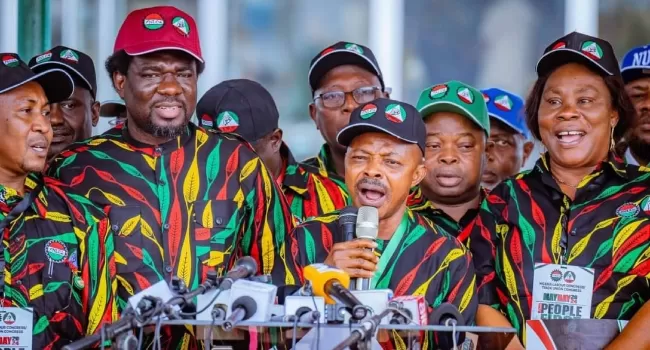NLC Decries Petrol Price Impact on Minimum Wage.

The Nigeria Labour Congress (NLC) has recently expressed significant concern over the impact of increased petrol prices on the proposed new minimum wage of ₦70,000. Here’s the latest based on the information available up to September 20, 2024:
- Price Hike Impact: The NLC has stated that the recent hike in petrol prices has essentially nullified the benefits of the new minimum wage, which has not yet been implemented. This increase in fuel costs directly affects the purchasing power of workers, rendering the new minimum wage “useless” or ineffective in real terms.
- Government Meeting: In response to the situation, the NLC announced plans to meet with the federal government. The purpose of this meeting was to discuss strategies on how workers could cope with or mitigate the effects of the increased petrol prices. This indicates an ongoing dialogue between labor unions and the government to address the economic pressures faced by Nigerian workers.
- Public Sentiment: Public sentiment, as reflected on platforms like X, shows frustration and disbelief over the disparity between the cost of living, particularly fuel prices, and the minimum wage. There’s a palpable sense of economic strain among Nigerians, highlighted by posts comparing local wages to fuel and currency exchange rates, underscoring a broader economic dissatisfaction.
- NLC’s Stance on Minimum Wage and Fuel Prices: The NLC has criticized the government for what they perceive as a betrayal, given previous discussions and assurances regarding fuel price stability during negotiations for the minimum wage. This includes rejecting an earlier proposal by President Tinubu that linked a higher minimum wage to a significant increase in fuel prices, indicating a dispute over economic policy direction between the government and labor unions.
- Economic Implications: The situation underscores a broader economic issue where fuel price adjustments, often linked to global oil market fluctuations or policy decisions like subsidy removal, directly influence the cost of living. This, in turn, pressures wage negotiations, highlighting the delicate balance between economic policy, inflation, and living standards.
This scenario paints a picture of ongoing tension between economic policy implementation and its real-world impacts on the average Nigerian worker, with the NLC advocating for measures that would ease the burden of rising living costs against the backdrop of a proposed but not yet implemented minimum wage increase.







